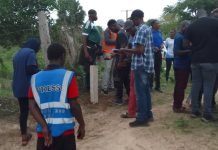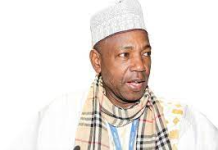 Activista, in collaboration with Action Aid International The Gambia (AAITG) Local Right Programs, had participate in a community sensitization in Naimina East, West, Dankunku and Upper Nuimi Districts in CRR and NBR respectively from the 3rd to 8th June 2015.
The sensitization brought together women small holder farmers, gender action group representatives and women assembly executive members.
The forum was meant to discuss issues affecting women’s ownership and control over land and its importance to feed The Gambia with emphasis on creating awareness and promotion of the FAO Tenure Guidelines as well as further strengthen the Rural Women Assemblies.
According to the Acting Coordinator of Activista, Mr. Nfamara Jarju, the sensitization is meant to help inform the general public on the negative effects of land grabbing on the lives and livelihoods of community members as well as create community awareness on the FAO Tenure Guidelines to trigger demands for effective implementation.
During the discussion, Mr. Jarju said Land for Campaign is ActionAid multi-country campaign that aims to deliver on three objectives:
– Objective 1: By 2017, we will challenge and reduce the incentives that fuel land grabbing
Activista, in collaboration with Action Aid International The Gambia (AAITG) Local Right Programs, had participate in a community sensitization in Naimina East, West, Dankunku and Upper Nuimi Districts in CRR and NBR respectively from the 3rd to 8th June 2015.
The sensitization brought together women small holder farmers, gender action group representatives and women assembly executive members.
The forum was meant to discuss issues affecting women’s ownership and control over land and its importance to feed The Gambia with emphasis on creating awareness and promotion of the FAO Tenure Guidelines as well as further strengthen the Rural Women Assemblies.
According to the Acting Coordinator of Activista, Mr. Nfamara Jarju, the sensitization is meant to help inform the general public on the negative effects of land grabbing on the lives and livelihoods of community members as well as create community awareness on the FAO Tenure Guidelines to trigger demands for effective implementation.
During the discussion, Mr. Jarju said Land for Campaign is ActionAid multi-country campaign that aims to deliver on three objectives:
– Objective 1: By 2017, we will challenge and reduce the incentives that fuel land grabbing – Objective 2: Women and communities rights to land are secured and advanced through the existence and implementation of just land laws and effective governance system
– Objective 3: Women and communities in 9 active #LandFor campaign countries including The Gambia resist land-grabs, defend and claim their land rights
Mr. Jarju also explained the concept of AAI and other INGOs Kilimanjaro Initiative. He told the communities that in 2014 and 2015, ActionAid will be organizing rural women assemblies to call for the adoption of the Tenure Guidelines and oppose land-grabs in countries they are supporting in their Land for Campaigns.
These assemblies are the beginning of communities’ engagement to towards Kilimanjaro big events.
Towards this initiative, he said, women from all over Africa will converge in 2016 in four regional women’s caravans to meet at Mount Kilimanjaro to read and announce their challenges and demands on land grabbing and general injustices around land access, control and ownership to policy makers.
During the discussions, it was indicated that poverty and food insecurity is a national concern which need to be addressed and the only way to addressed them is for women to control and own land which they can use to cultivate both subsistence and cash crop.
The women pointed out that some women work hard with their husband to develop the family land, but when they have misunderstanding between them which led to divorced, the woman will lost everything she has contribute in developing the land, as culture and tradition did not give them any right to own land.
Sainey Sima of Jareng Village, Niamina East District, indicated that such a practice must stop because when the men were clearing the farm lands, they the women were responsible for the upkeep of the family.
According to Teddy Jallow, a participant, she is happy to inform the gathering that the formation of the rural women assembly in Dankunku really benefited her because of the fact that before its formation, the requests she had been making from her brothers to access a portion of their family land for agricultural purpose has always been turned down by them. She said the rural women assembly has given her a portion from the family land.
When asked whether the land was controlled and owned by her, she responded that she is working on the land.
It was pointed out by the Activista team that any woman who is given a land to control and own should try to register it in her name so that it will not be taken back from her.
At the end of each meeting, participants were asked to re-structure their ten member committees by making the male members as advisers so that all the members of Rural Women Assembly will be females.
The ten member committees are to serve as coordinating arms and conveners of rural women assemblies’ issues and concerns to the Local Authorities in districts and regions.
]]>
– Objective 2: Women and communities rights to land are secured and advanced through the existence and implementation of just land laws and effective governance system
– Objective 3: Women and communities in 9 active #LandFor campaign countries including The Gambia resist land-grabs, defend and claim their land rights
Mr. Jarju also explained the concept of AAI and other INGOs Kilimanjaro Initiative. He told the communities that in 2014 and 2015, ActionAid will be organizing rural women assemblies to call for the adoption of the Tenure Guidelines and oppose land-grabs in countries they are supporting in their Land for Campaigns.
These assemblies are the beginning of communities’ engagement to towards Kilimanjaro big events.
Towards this initiative, he said, women from all over Africa will converge in 2016 in four regional women’s caravans to meet at Mount Kilimanjaro to read and announce their challenges and demands on land grabbing and general injustices around land access, control and ownership to policy makers.
During the discussions, it was indicated that poverty and food insecurity is a national concern which need to be addressed and the only way to addressed them is for women to control and own land which they can use to cultivate both subsistence and cash crop.
The women pointed out that some women work hard with their husband to develop the family land, but when they have misunderstanding between them which led to divorced, the woman will lost everything she has contribute in developing the land, as culture and tradition did not give them any right to own land.
Sainey Sima of Jareng Village, Niamina East District, indicated that such a practice must stop because when the men were clearing the farm lands, they the women were responsible for the upkeep of the family.
According to Teddy Jallow, a participant, she is happy to inform the gathering that the formation of the rural women assembly in Dankunku really benefited her because of the fact that before its formation, the requests she had been making from her brothers to access a portion of their family land for agricultural purpose has always been turned down by them. She said the rural women assembly has given her a portion from the family land.
When asked whether the land was controlled and owned by her, she responded that she is working on the land.
It was pointed out by the Activista team that any woman who is given a land to control and own should try to register it in her name so that it will not be taken back from her.
At the end of each meeting, participants were asked to re-structure their ten member committees by making the male members as advisers so that all the members of Rural Women Assembly will be females.
The ten member committees are to serve as coordinating arms and conveners of rural women assemblies’ issues and concerns to the Local Authorities in districts and regions.
]]>




















